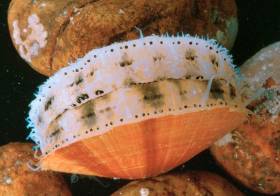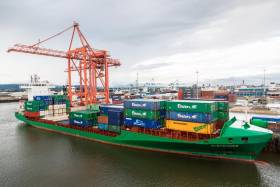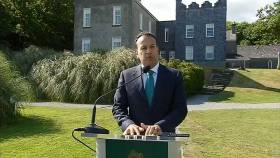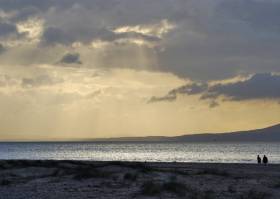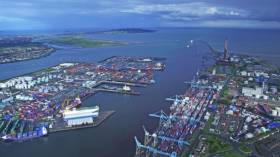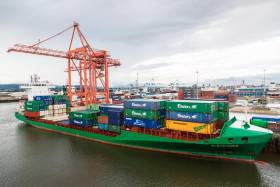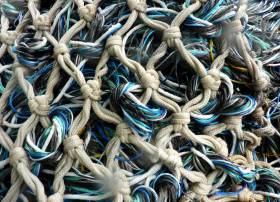Displaying items by tag: Brexit
Downing Street Moves To Defuse Tensions Over English Channel ‘Scallop Wars’
#Fishing - Authorities in France and the UK have stepped into the ‘scallop wars’ that broke out between rival fishing fleets in the English Channel near Le Havre last week.
As the Guardian reports, some 35 French boats chased away five British vessels off the Normandy coast in a standoff over restrictions on the region’s scallop fishery.
Between March and October, French boats are barred from fishing for scallops in the 40 miles of international waters off Normandy called the Baie de Seine.
Smaller British boats dredging for scallops in the same waters are under no such prohibition, which has raised the ire of their French counterparts who claim their stocks are being poached.
The French navy has already pledged to intervene in the event of any further clashes — prompting Downing Street to push for further talks between the two sides.
The Guardian has much more on the story HERE.
European Commission Urges Preparedness For Brexit In Maritime Sector
#Brexit - The latest Marine Notice from the Department of Transport, Tourism & Sport (DTTAS) sets out the European Commission’s recommended actions for Brexit preparedness for all stakeholders that may be affected by the UK’s withdrawal from the European Union next year.
Examples of necessary legislative changes at an EU level are indicated in the communication attached to Marine Notice No 34 of 2018. Some of these relate to the maritime sector.
The DTTAS also draws attention to other technical notices published by the European Commission, which set out the legal and practical implications of a no-deal Brexit. The department has published four of these notices relevant to maritime transport:
- Notice to Stakeholders in the Field of Industrial Products
- Notice to Stakeholders on Seafarers Certificates
- Notice to Stakeholders in the Field of Maritime Transport
- Notice to Stakeholders – EU Ship Recycling Regulation
The relevant notices were attached to Marine Notice No 7 of 2018 and Marine Notice No 23 of 2018.
Full details of all previous stakeholder notices are available from the European Commission website.
Varadkar Announces 1,000 New Customs and Veterinary Inspectors Needed In Preparation For Brexit
#IrishPorts - The Taoiseach Leo Varadkar has said Ireland will have to hire around 1,000 new customs and veterinary inspectors to prepare the nation's ports and airports for Brexit.
As the Journal.ie reports, Varadkar said that “with growing uncertainty” about whether the UK government will pass a withdrawal agreement through Westminster, Ireland will need to “change the gear and up our preparations when it comes to Brexit”.
He was speaking after a Cabinet meeting at Derrynane in Co Kerry.
Varadkar said that this plan includes making preparations to our ports and airports, including Dublin Airport, Dublin Port and Shannon, for a change to the rules of trade between Ireland and Britain in January 2021.
“That involves preparing for and hiring veterinary inspectors to carry out sanitary checks on agricultural products and plant-based products coming in from Britain and also customs inspectors,” Varadkar said.
“We estimate that the number of people we will have to hire over the course of the next year is about 1,000 people. That’s customs and veterinary inspectors to prepare our ports and airports for Brexit.”
To read more including a list of Government measures that the cabinet has signed off, click here.
#Oysters - Unauthorised oysters farms have exploded in number on Lough Foyle amid a continued dispute over its ownership, as the Belfast Telegraph reports.
The estuary between the counties of Donegal and Derry remains a point of contention as Brexit looms, with both the UK and Irish governments claiming dominion over its waters.
As a result, there has been a proliferation of unregulated oyster farming that could be worth £20 million or €22.89 million each year, according to the Loughs Agency.
The Belfast Telegraph has more on this story HERE.
#IrishPorts - There are growing calls writes the Irish Examiner for additional funding to be given to ports to improve connectivity to continental Europe following Brexit.
Speaking at a joint Irish Road Haulage Association (IRHA) and Rosslare Europort conference in Wexford, EU Commissioner for Agriculture and Rural Development, Phil Hogan said that Brexit will happen and that its final model was the only question that remained.
He called for a doubling of capacity at Rosslare, and for all ports to examine capacity, adding the forthcoming EU regional policies from 2021 to 2027 represented an opportunity for funding for which the Republic must be ready.
President of the IRHA, Verona Murphy said that because the Europort in Rosslare represents the shortest sea route for goods and passengers to continental Europe, it was ideally positioned to expand and grow in a post-Brexit scenario.
For further reading click here.
#IrishPorts - A leading EU official overseeing a key element of the CEF ‘Motorways of the Sea’ project has confirmed that Ireland will have increased funding opportunities under the programme after plans for it were rewritten to take into account of Brexit implications here.
Speaking at a seminar writes the Limerick Post on ‘Understanding the Opportunities from the EU’, hosted by Shannon Foynes Port Company in Limerick on Friday, European Coordinator for Motorways of the Sea Brian Simpson also told Irish ports and maritime officials “you’re pushing an open door with me”.
The “Motorways of the Sea” concept, which has significant funding available, aims to introduce new inter-modal maritime-based logistics chains in Europe, which should improve our transport organisation within the years to come.
And in another vote of support for Ireland, a second leading EU official, European Coordinator for the powerful TEN-T North Sea-Mediterranean Corridor and former Commissioner for Regional Policy Professor Peter Balazs, told the seminar that Ireland is a special case and solutions need to be found.
For further reading on the conference, click here.
#Brexit - Irish shipping firms are making plans to bypass ports in Britain for direct routes to the continent to avoid any potential Brexit complications, as the Irish Independent reports.
While freight traffic between Ireland and the UK will continue, a number of companies have already launched direct sea connections between Dublin and ports in Spain, France, Belgium and the Netherlands.
This is in spite of assurances by Westminster that future trade between the UK and EU would be frictionless.
The news comes as Irish ports shared concerns of isolation from the European shipping network post-Brexit, while ports in Wales could be adversely impacted by customs and border checks on routes across the Irish Sea.
#Brexit - The European Commission has published notices to stakeholders in maritime transport and in seafarers’ certificates in preparation for the United Kingdom’s exit from the European Union.
These notices are intended to facilitate preparation by EU-27 Member States and by wider stakeholders for the contingency that on 30 March 2019 the UK leaves the EU without a deal on a transitional period having been agreed (ie the no deal, disorderly Brexit scenario).
Draft legal text on a transition period, extending to 31 December 2020, is currently being negotiated with the UK. If, as part of the withdrawal process, this text is agreed and approved by EU member states and the European Parliament, many of the elements reflected in these notices will only become relevant at the end of the transition period.
However, in cases where UK ‘leading authorities’ conduct risk assessments, examinations, approvals and authorisation procedures under EU law, a leading authority in an EU-27 member state will need to take over from the UK authority from the withdrawal date (29 March 2019).
UK leading authorities currently provide product authorisations for certain medicines, pesticides, biocides, chemicals (REACH) and plant varieties. The commission has begun engaging EU-27 technical experts to seek to ensure that product authorisation processes transfer from UK leading authorities in the smoothest manner possible.
Full details are included in Marine Notice No 07 of 2018, a PDF of which is available to read or download HERE.
As previously reported on Afloat.ie, the European Sea Ports Organisation has developed a position paper calling on Brexit negotiators to prioritise maritime transport in the second phase of negotiations.
Concerns Over Supertrawlers In Inshore Waters Discussed At National Fisheries Forum
#Fishing - Marine Minister Michael Creed hosted the 13th meeting of the National Inshore Fisheries Forum (NIFF) yesterday, Thursday 22 February.
The Inshore Fisheries Forum structures, which include NIFF and six Regional Inshore Fisheries Forums (RIFFs), were established in 2014 to foster stakeholder-led development of proposals for the inshore fishing sector.
Minister Creed announced that he expects to publish a consultation paper to review the options for more restricted access for large fishing vessels fishing by means of trawls inside Ireland’s six-nautical-mile zone.
This issue has been the subject of scientific and economic reports by the Marine Institute and Bord Iascaigh Mhara (BIM) and some preliminary engagement with fisheries representative groups, including the NIFF.
“I recognise that this issue has been raised by the National Inshore Fisheries Forum since its inception and that there are concerns about the relatively open access for large trawlers to our inshore areas,” said the minister. “The inshore fisheries sector, including coastal and island fisherman, is dependent on inshore fish stocks.
“I am open to looking at the benefits, from an economic perspective for the inshore fleet of introducing some restrictions on large vessels. This could also have a positive biological impact on fish stocks and biodiversity.
“I am awaiting a paper from the department setting out the issues, possible benefits and options to inform my consideration of the issues and possible impacts, both positive and negative. I am planning to undertake a public consultation on the options and to hear and understand the diverse interests of stakeholders to ensure that any new measures introduced are fair and balanced.”
Minister Creed and the NIFF also discussed feedback on recent public consultations on conservation measures for brown crab and razor clams.
The consultations were held following recommendations from the NIFF and the measures are under consideration for their potential benefits to protect fish stocks in the long term. The minister also discussed the impact of Brexit on the fishing sector.
In addition, the NIFF updated the minister on its progress in preparing a sector-specific strategy for the first time.
Supported by BIM and a steering group including the Department of Agriculture, Food and the Marine; the Marine Institute; and the SFPA, consultants are facilitating the preparation of an Inshore Fisheries Strategy on behalf of the NIFF.
Steps taken to date include preliminary consultation, a workshop with the Regional Inshore Fisheries Forums and feedback sessions with the Steering Group.
Minister Creed welcomed the news that the next expected output is a draft strategy document for public consultation.
Dutch Want Certainty For Post-Brexit Fishing Policy
#Fishing - The Netherlands has demanded certainty for Europe’s fishing industry after the UK’s withdrawal from the Common Fisheries Policy, as The Guardian reports.
Dutch fisheries minister Carola Schouten called on UK environment secretary Michael Gove to provide a formal proposal for arrangements between the British and European fishing communities post Brexit.
Gove and UK fisheries minister George Eustace have been critical of the CFP quota system but the UK has yet to put forward an alternative, Schouten argues.
Lough Foyle on Ireland’s North Coast is one of many outstanding issues that need to be resolved upon Britain’s exit from the EU and its policies, as Tom MacSweeney mused earlier this month.
“It is one sea, we have to share it,” she said. “I think it is proven that the [quota] system works.”
A promised white paper on the UK’s fisheries failed to appear before the end of 2017, prompting criticism from Scotland’s fishing community in particular.
The Guardian has more on the story HERE.


























